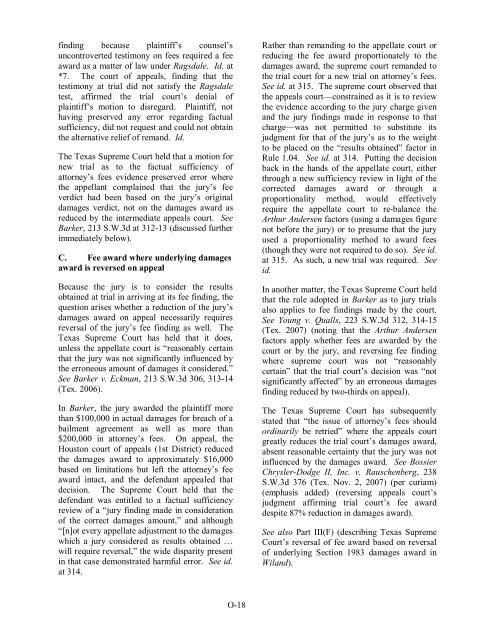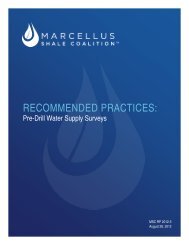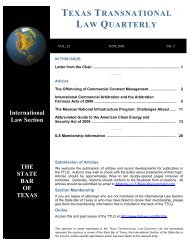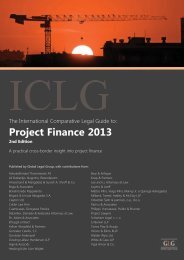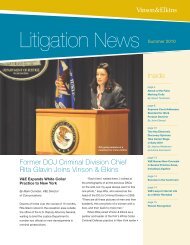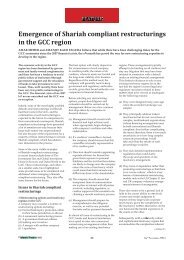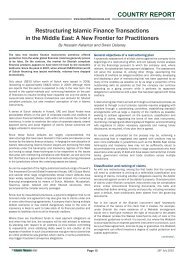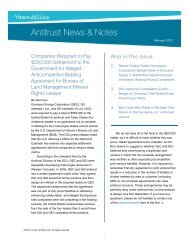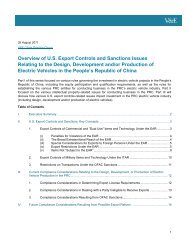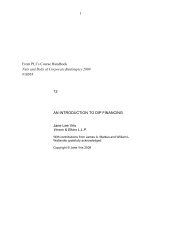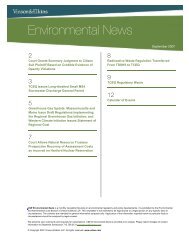Attorney's Fees Update - Vinson & Elkins LLP
Attorney's Fees Update - Vinson & Elkins LLP
Attorney's Fees Update - Vinson & Elkins LLP
Create successful ePaper yourself
Turn your PDF publications into a flip-book with our unique Google optimized e-Paper software.
finding because plaintiff’s counsel’s<br />
uncontroverted testimony on fees required a fee<br />
award as a matter of law under Ragsdale. Id. at<br />
*7. The court of appeals, finding that the<br />
testimony at trial did not satisfy the Ragsdale<br />
test, affirmed the trial court’s denial of<br />
plaintiff’s motion to disregard. Plaintiff, not<br />
having preserved any error regarding factual<br />
sufficiency, did not request and could not obtain<br />
the alternative relief of remand. Id.<br />
The Texas Supreme Court held that a motion for<br />
new trial as to the factual sufficiency of<br />
attorney’s fees evidence preserved error where<br />
the appellant complained that the jury’s fee<br />
verdict had been based on the jury’s original<br />
damages verdict, not on the damages award as<br />
reduced by the intermediate appeals court. See<br />
Barker, 213 S.W.3d at 312-13 (discussed further<br />
immediately below).<br />
C. Fee award where underlying damages<br />
award is reversed on appeal<br />
Because the jury is to consider the results<br />
obtained at trial in arriving at its fee finding, the<br />
question arises whether a reduction of the jury’s<br />
damages award on appeal necessarily requires<br />
reversal of the jury’s fee finding as well. The<br />
Texas Supreme Court has held that it does,<br />
unless the appellate court is “reasonably certain<br />
that the jury was not significantly influenced by<br />
the erroneous amount of damages it considered.”<br />
See Barker v. Eckman, 213 S.W.3d 306, 313-14<br />
(Tex. 2006).<br />
In Barker, the jury awarded the plaintiff more<br />
than $100,000 in actual damages for breach of a<br />
bailment agreement as well as more than<br />
$200,000 in attorney’s fees. On appeal, the<br />
Houston court of appeals (1st District) reduced<br />
the damages award to approximately $16,000<br />
based on limitations but left the attorney’s fee<br />
award intact, and the defendant appealed that<br />
decision. The Supreme Court held that the<br />
defendant was entitled to a factual sufficiency<br />
review of a “jury finding made in consideration<br />
of the correct damages amount,” and although<br />
“[n]ot every appellate adjustment to the damages<br />
which a jury considered as results obtained …<br />
will require reversal,” the wide disparity present<br />
in that case demonstrated harmful error. See id.<br />
at 314.<br />
Rather than remanding to the appellate court or<br />
reducing the fee award proportionately to the<br />
damages award, the supreme court remanded to<br />
the trial court for a new trial on attorney’s fees.<br />
See id. at 315. The supreme court observed that<br />
the appeals court—constrained as it is to review<br />
the evidence according to the jury charge given<br />
and the jury findings made in response to that<br />
charge—was not permitted to substitute its<br />
judgment for that of the jury’s as to the weight<br />
to be placed on the “results obtained” factor in<br />
Rule 1.04. See id. at 314. Putting the decision<br />
back in the hands of the appellate court, either<br />
through a new sufficiency review in light of the<br />
corrected damages award or through a<br />
proportionality method, would effectively<br />
require the appellate court to re-balance the<br />
Arthur Andersen factors (using a damages figure<br />
not before the jury) or to presume that the jury<br />
used a proportionality method to award fees<br />
(though they were not required to do so). See id.<br />
at 315. As such, a new trial was required. See<br />
id.<br />
In another matter, the Texas Supreme Court held<br />
that the rule adopted in Barker as to jury trials<br />
also applies to fee findings made by the court.<br />
See Young v. Qualls, 223 S.W.3d 312, 314-15<br />
(Tex. 2007) (noting that the Arthur Andersen<br />
factors apply whether fees are awarded by the<br />
court or by the jury, and reversing fee finding<br />
where supreme court was not “reasonably<br />
certain” that the trial court’s decision was “not<br />
significantly affected” by an erroneous damages<br />
finding reduced by two-thirds on appeal).<br />
The Texas Supreme Court has subsequently<br />
stated that “the issue of attorney’s fees should<br />
ordinarily be retried” where the appeals court<br />
greatly reduces the trial court’s damages award,<br />
absent reasonable certainty that the jury was not<br />
influenced by the damages award. See Bossier<br />
Chrysler-Dodge II, Inc. v. Rauschenberg, 238<br />
S.W.3d 376 (Tex. Nov. 2, 2007) (per curiam)<br />
(emphasis added) (reversing appeals court’s<br />
judgment affirming trial court’s fee award<br />
despite 87% reduction in damages award).<br />
See also Part III(F) (describing Texas Supreme<br />
Court’s reversal of fee award based on reversal<br />
of underlying Section 1983 damages award in<br />
Wiland).<br />
O-18


